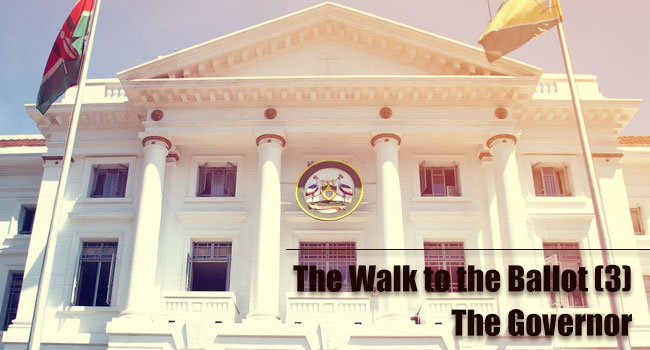The Walk to The Ballot 3: The Governor

Having marked your choice for the Commander in Chief, it is time to pick a Commander for your County. It's important to note that Devolution is a creation of the new Constitution; We did not have County Governments until after the March 4th, 2013 General election. The distinction between the National and County Governments, headed by the President and the Governor respectively, is based mainly on their functions and the areas of jurisdiction.
The Constitution has made a clear distinction of the functions of the two governments, and it has also made provisions to facilitate co-operation between them. These are contained in the fourth schedule of the Constitution.
To start us off, let us first establish exactly who a Governor is. In the Kenyan context, the Governor is the duly-elected leader of any of the 47 counties in the country. The title is also used by extension to refer to the Chief Executive Officer of the Central Bank of Kenya; you will notice the reference in Kenyan currency notes.
Similar to the President, the Governor is also referred to as 'His Excellency'. I said "His" because we are yet to get a woman Governor but hopefully this will change with the upcoming 2017 elections.
The second thing we need to establish is, who can be a Governor? Again, as it is with the President, there is a strict criteria that one has to meet if they wish to become a Governor. According to the Constitution, the hopeful candidate has to;
- be a citizen of Kenya by birth;
- be a registered voter;
- be of sound mind;
- be qualified to stand for election as a Member of the County Assembly;
- be nominated by a political party or be an independent candidate;
- Satisfy any educational, moral and ethical requirements prescribed by the Constitution or Act of parliament; The moral and ethical requirements are specified in chapter six of the Constitution and in the Leadership and Integrity Act while the educational requirement was set at secondary level with bills in offset seeking to raise the bar.
- NOT be a public officer, or be acting in any state office or other public officer except for persons serving in the offices of governor, deputy governor, Member of County Assembly or Member of Parliament.
It is important that the members of the Independent Electoral and Boundaries Commission (IEBC) are disqualified from being elected if they have held the office at any time within the five years immediately before the date of election.
Finally, this is probably the most important question you need to have answered before you pick the person you want to be your next Governor from the list of names on the Ballot Paper. What exactly does the Governor do?
As it is with the President, the candidate hoping to be Governor has to announce a running mate who shall then become the Deputy Governor upon an election win. The 2013 election was the first General Election since the promulgation of the new Constitution. That meant that it was also the first time people elected a Governor. There was no known precedent on what the Governor was meant to do first. The normal scenario is that after the election, the Governor Elect would embark on forming a County Executive Committee - the Executive Arm of their County Government.
The functions and responsibilities of the Governor are set out in Section 30(2) of the County Government Act and they include among others to:
- diligently execute the functions and exercise the authority provided for in the Constitution and in Legislation;
- perform such State functions within the County as the President may from time to time assign on the basis of mutual consultations;
- represent the County in national and international fora and events;
- appoint, with the approval of the County Assembly, the County Executive Committee in accordance with Article 179(2)(b) of the Constitution;
- constitute the County Executive Committee portfolio structure to respond to the functions and competencies assigned to and transferred to each County;
- submit the County plans and policies to the County Assembly for approval;
- consider, approve and assent to bills passed by the County Assembly;
- chair meetings of the County Executive Committee;
- by a decision notified in the County Gazette, assign to every member of the County Executive Committee, responsibility to ensure the discharge of any function within the County and the provision of related services to the people;
- submit to the County Assembly an annual report on the implementation status of the County policies and plans
- deliver annual State of the County address containing such matters as may be specified in County legislation; and
- Sign and cause to be published in the County Gazette, notice of all important formal decisions made by the Governor or by the County Executive Committee.
It's important to note that the Governor and the Deputy Governor can only hold office for two terms when elections are held on the second Tuesday of August, every fifth year. The Deputy Governor is the principal assistant in the execution of the Governor's functions. They shall also act as Governor when the Governor is absent or temporarily incapacitated.
You may have noticed that the Governor's term is more defined than the President's, but as a result the process of extending their term is less tedious. The Governor will remain in office until the duly elected Governor is sworn in.
In the next part, we will look at the representative seats that is the Legislators...





